Manual Handling Train The Trainer By Highly Experienced Instructors
If you want to be the best trainer possible, learn from our industry leading health professionals.
Our Physiotherapists and osteopaths deliver manual handling instructor training from a wealth of knowledge and unrivalled depth of experience.
As a manual handling instructor you will have the ability to reduce injuries while increasing worker productivity, performance and satisfaction.
NOTE – This is for material handling businesses only (not people handling)
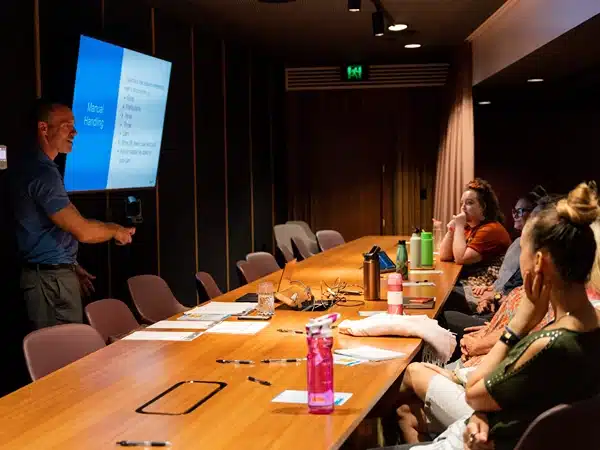
Manual handling handling train the trainer options
Package 1 refresh and update your current manual handling training
View details of us helping to update and refresh your current training course
Who: Businesses who are wanting to update manual task training internally within their business and ensure they are mapping it against best practice and Australian Codes of Practice
Attendees: Attendees must have a training background (certificate in TAE or equivalent) or have a health and safety background (certificate or diploma in OHS or higher). Maximum 4 attendees per course.
What’s involved:
Phase 1 – Planning Phase (Face to face or online)
- Step 1: Industry bench marking meeting to review where your current practices map against best practice and Australian Codes of Practice
- Step 2. Needs analysis meeting to determine what your objectives are and how training will be implemented into your business
Phase 2 – Review manual tasks
- Site visit to view manual tasks and review manual tasks mechanisms within the business.
- Note: If a site visit is not possible we will require detailed outline of manual tasks completed, including photo/video from client.
Phase 3: Course creation and update
- Create/update customised manual handling training course and practical components of training according to best practice guidelines for your business.
Phase 4: Train the trainer course delivery
- 1 day (7 hour) train the trainer course – site visit 2.
Requirements:
1. Onsite training conducted at your training facility
2. Training incorporates a combination of theory and practical application of training
3. Multiple choice questionnaire assessing trainers knowledge
4. Assessment of training delivery – theory and practical delivery by each individual
Includes:
1. Work books for each attendee with notes to support delivery of manual handling training
2. Certificate of completion
Additional training option (Phase 5) – Training content and delivery support
- Half day onsite or online consultation
Includes:
1. Review training package with trainers/business
2. Additional training/coaching support around any identified knowledge gaps and/or practical skills
3. Edits to training content/length after feedback from trainers upon delivery
Outcome:
- Upskill your workplace trainers in delivering best practice manual handling training
- Develop a manual handling training program that can be managed internally within the business
Investment: Starting at $4500+GST
Package 2 manual handling train the trainer course
View details of us helping to build your training course
Who: Businesses who are wanting to implement manual task training internally within their business
Attendees: Attendees must have a training background (certificate in TAE or equivalent) or have a health and safety background (certificate or diploma in OHS or higher). Maximum 4 attendees per course.
What’s involved:
Phase 1 – Planning Phase (Face to face or online)
- Step 1: Industry bench marking meeting to review where your current practices map against best practice
- Step 2. Needs analysis meeting to determine what your objectives are and how training will be implemented into your business
Phase 2 – Review manual tasks
- Site visit to view manual tasks and review manual tasks mechanisms within the business.
- Note: If a site visit is not possible we will require detailed outline of manual tasks completed, including photo/video from client.
Phase 3: Course creation
- Create customised manual handling training course and practical components of training according to best practice guidelines for your business.
Phase 4: Train the trainer course delivery
- 1 day (7 hour) train the trainer course – site visit 2.
Requirements:
1. Onsite training conducted at your training facility
2. Training incorporates a combination of theory and practical application of training
3. Multiple choice questionnaire assessing trainers knowledge
4. Assessment of training delivery – theory and practical delivery by each individual
Includes:
1. Work books for each attendee with notes to support delivery of manual handling training
2. Certificate of completion
Additional training option (Phase 5) – Training content and delivery support
- Half day onsite or online consultation
Includes:
1. Review training package with trainers/business
2. Additional training/coaching support around any identified knowledge gaps and/or practical skills
3. Edits to training content/length after feedback from trainers upon delivery
Outcome:
- Upskill your workplace trainers in delivering best practice manual handling training
- Develop a manual handling training program that can be managed internally within the business
Investment: Starting at $5500+GST
Organisations Who Trust Our Assessor Training

government

council
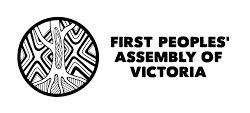
nonprofit

nonprofit

nonprofit
Organisations Who Trust Our Work From Home Assessments & Ergonomic Workstation Setup

education

university

banking
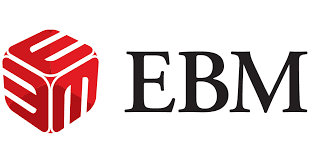
finance

insurance

superannuation

accounting

legal

technology
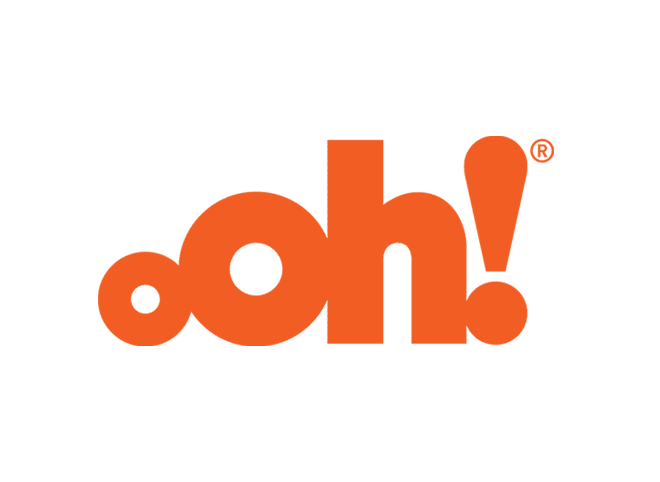
communication
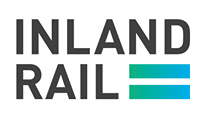
transport

logistics

mining
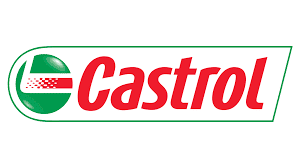
resources
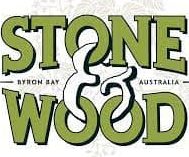
manufacturing

agriculture
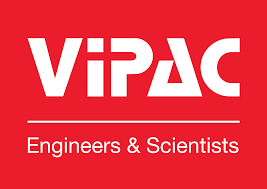
engineering

construction

property

architecture

retail
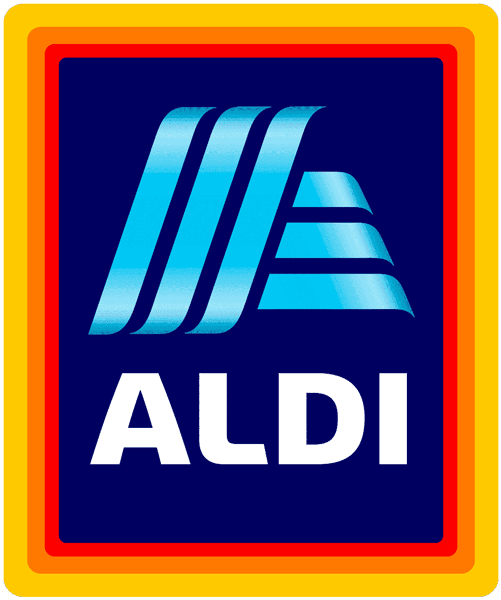
supermarket
Manual Handling Train the Trainer Case Study
A business identified the need to upskill their key health and safety / injury management team members in manual handling training so that they could deliver ongoing manual handling training within their organisation.
Background & Reason For Consultation
The business identified that they had gaps in their risk management program with regards to manual tasks and training because they only outsourced manual handling training every 2- 3 years.
The business has a large number of workers whose jobs are primarily manual task related and will often have new starters or casuals working within the organisation.
Proposed Services & Implementation
Corporate Work Health Australia consulted the business to determine what their current manual tasks risk management process incorporated and propsed the following services:
- Consultation with current stakeholders within the organisation to discuss primary manual tasks, challenges, hazards and risks
- Review of current manual handling training within the organisation
- Development of customised manual handling training package that focused on new workers, tool box talks and refresher training
- 2 day manual handling train the trainer course delivered to key workers who would deliver ongoing training
- Review and catch up with key trained workers remotely and face to face at month 1, 3, 6 and 12.
Outcomes & Recommendations
Outcomes
- Key stakeholders were trained so that they could deliver ongoing manual task training within the business
- Development of a manual handling training program and specific training contents
Further Recommendations
- Continue to review and monitor training materials, injuries and mechanisms within the workplace to identify areas to focus on and further develop training and risk management strategies.
Book An Online Meeting With One Of Our Directors
Our directors have over 20 years experience! A online video call is recommended for organisations wanting customised manual handling assessor training. Choose the state you require service delivery in via the buttons below to book a FREE online meeting or call and we will find a time that suits you.
Customised Manual Handling Instructor Training
Manual handling train the trainer services allow companies to take control of and better manage the risk of workplace injury and build a sustainable working model suited to their business. Our goal is to tailor design a manual handling training program that is built around your specific business, crafted to deliver the best possible outcomes and in a way that is relevant to your employees.
Sometimes the smallest and seemingly least impactful processes and actions can lead to injury or accident. At Corporate Work Health Australia, we seek to provide our clients with objective insight into their workplace through the manual handling trainer training, which will indicate where improvements could be made to lessen the burden on your workers and, in turn, reduce the number of minor complaints and,
Read More
Train The Trainer Manual Handling
Workplaces are constantly in flux. From one year to another a business might see a turnover of staff in small or large numbers, depending on the size of the organisation. As such, it is essential if your workers will engage in office work or manual handling, the necessary skills and education are in place to ensure that new hires are competently briefed on how best to carry it out in a manner that reduces the risk of injury or accident, which can be accomplished through the manual handling assessor training.
At Corporate Work Health Australia, our manual handling train the trainer services are a sure fire way to increase the knowledge base of your company in terms of how best to manage a healthy and safe environment. Our team is made up of health professionals who are also business owners, and so you can depend on us to deliver a service that is simultaneously practical and designed from wealth and depth of experience.
As a business owner, we know that your top priority is the health, safety and wellbeing of your staff. If they are fit and content in their work, then you can expect to see productivity increase and your profitability grow as a consequence. Our manual handling train the instructor service seeks to prevent and manage musculoskeletal complaints and we achieve this through assessing and eliminating workplace hazards through a manual handling risk assessment.
Train the Trainer Courses are a Proactive Solution
Implementing a carefully thought out plan for manual handling in a timely manner can make a huge difference. It will spare unnecessary wear and tear on your employees’ bodies, reduce the stress that they experience throughout the working day, which consequently limits the mental burden that an injury or accident can have, which makes for a much more positive life outside of the workplace.
At Corporate Work Health Australia, we believe that our manual handling train the trainer service alongside an ergonomic assessment is the ideal way for a business to embrace risk and safety strategies that will enable it to become more profitable and will make it less likely that key staff feel the need to seek employment elsewhere.
Another proactive solution that can improve the well being of your office from the get go is a functional capacity evaluation. This assessment ensures that the employee is capable of their duties and tasks and if not, it will outline what is lacking in their skills, this gives clearer clarity in terms of how much you need to train them or look to hire someone else that has the required skills for the task.
A safe and healthy workplace counts for a lot and we are the team to help you achieve this with our manual handling assessor training. So, get in touch with us today for a speedy quote and a route toward a happier, safer workforce.
Manual Handling Train the Trainer Courses Limits Risk in Your Workplace
Sometimes the smallest and seemingly least impactful processes and actions can lead to injury or accident. At Corporate Work Health Australia, we seek to provide our clients with objective insight into their workplace, which will indicate where improvements could be made to lessen the burden on your workers and, in turn, reduce the number of minor complaints and, indeed, absenteeism.
Manual handling train the trainer services allow companies to take control of and better manage the risk of workplace injury and build a sustainable working model suited to their business. Our goal is to tailor-design a program that is built around your specific business, crafted to deliver the best possible outcomes and in a way that is relevant to your employees.
Those that participate in the manual handling assessor training course gain a greater understanding of the risks that are present in the workplace and how to instruct their staff in terms of manual handling. The education gained through the manual handling train the trainer service will afford you the chance to streamline and improve your processes and practices, even in small ways, which can lead to the greater overall wellbeing of those you employ.
Reduce Injuries and Compensation
Manual handling is the most common cause of injury in Australia. 107,355 serious claims were lodged in the 2014-15 financial year. Injury and musculoskeletal disorders led to 90% of these serious claims, with the most common traumatic joint/ligament and muscle/tendon injuries (almost 45%). In 2012–13, work-related injury and disease cost the Australian economy $61.8 billion. Injuries accounted for $28 billion (45%) of the cost.
Manual handling (now manual tasks 2010) means more than just lifting or carrying something. The term ‘manual tasks’ is used to describe a range of activities including lifting, lowering, pushing, pulling, carrying, moving, holding or restraining an object, animal or person. This means that all of your workers are exposed to and are at risk of manual handling injuries. Australian WHS (OH&S) legislation requires employers to identify, assess and control workplace hazards with the aim of injury prevention.
One of these hazards is the risk of injury caused by manual tasks. The national standard for manual tasks requires that all tasks in your workplace which involve manual handling are identified and that the risk of injury is assessed. Where there is risk of injury, suitable ‘control measures’ must be introduced. Manual handling train the trainer courses are one such control measure you could implement.
Common Causes of Manual Handling Injuries
Different managerial styles have created some of the greatest companies in the world. Some are driven forward by the ambition and inspiration of their leaders, while others adopt a synergistic approach that combines to achieve great things.
What they have in common are great people, great employees, the worker bees that push productivity. Manual handling train the trainer course is a tool that all managers, regardless of their style, should view as a means of protecting the assets that create value under their employ and promoting a greater degree of cohesion in workplace health.
The best kind of workplace is one that promotes open communication. Here at Corporate Work Health Australia, we have worked with many different companies and those that engage with the manual handling train the trainer courses that we develop and deliver typically share an enthusiasm for communication that brings the need for training to the attention of those that hold the purse strings.
Why Some Of Your Staff Manual Handling Assessor Training?
The workplace can be full of hazards with some being obvious and others less so. By providing your staff with manual handling instructor training for your business in Australia, you educate staff about best practice as well as their behaviours. By following the guidance of a inhouse assessor, you ensure that your workers are kept safe.
With our customised manual handling assessor training in Australia *, your package will be customised for your place of work. This involves consulting with key stakeholders before the training to discuss your current practice, training of your staff, plus an opportunity for your workers to ask any questions that they may have.
A Shining Reputation In Manual Handling Assessor Training
Here at Corporate Work Health Australia, we are fortunate to have the benefit of a sterling reputation among our past clients. In our most recent survey, 94% were likely or very likely to use our services again, while 92% reported that what we delivered met their expectations and achieved the outcome that they hoped for.
So, for the best manual handling train the trainer solutions Australia has to offer and to invest in the safety, morale and happiness of your workforce, get in touch with us today and let’s start the process toward designing a more productive and efficient workspace. We offer our service all around Australia contact us today for a free quote for your company.
Process
1. Enquiry
Call, email or complete a form. Let us know what you want to achieve or the problems you are having.
2. Consultation
Phone, video call or face to face. We will discuss your needs, make some suggestions and provide a quote.
3. Assessment
Your assessment and/or training package is 100% tailor made to suit your needs, budget and service requirements.
4. Training
Onsite, online or both. Your personalised package is delivered by health professionals with extensive clinical and teaching experience.
5. Results
We have helped thousands of people at some of Australia’s top companies. Our team will work with you every step of the way to ensure you achieve the right results for your company and for your workers.
Manual Handling Trainer Benefits For Companies
- Manage manual handling hazard/risks and training internally within your business
- Train up key workers through the manual handling train the assessor training in being able to deliver manual handling training internally within the workplace
- Trained workers can deliver regular training within the business for new starters and job role changes
- Internal trainers can implement systems change, return to work employees and tool box talks
- Reduced costs by eliminating the need to outsource manual handling training
Manual Handling Trainer Benefits For Employees
- Employees can be trained in manual handling immediately upon starting as part of their induction or following a change in workflow, job tasks or equipment changes
- Increased knowledge in risk management and injury prevention strategies to assist the business in problem solving manual tasks hazards and risks
- Reduced risk of developing manual handling injuries in the workplace through greater awareness and understanding of manual task hazards
- Improved manual handling practices and work efficiency for both the individual and team
- Greater worker engagement and consultation within the workplace leading to improved workplace culture
Free Basic Manual Handling Risk Evaluation
Answer a few questions and receive a free online consultation with one of our highly experienced occupational health professionals
Frequently Asked Questions
What does the train the trainer course involve?
Our train the trainer course involves our health professional training up your key stakeholders i.e. OHS rep or managers to deliver manual handling training internally within the business.
What is covered in the manual handling train the trainer course?
Our train the trainer course looks to include the following:
- Key areas that need to be covered when delivering manual handling training
- How to develop and create a robust manual handling training course
- Strategies for delivering manual handling training
Who delivers the train the trainer course?
Our manual handling train the trainer courses are delivered by our health professionals who have extensive occupational health experience, but also teaching and training experience. Our trainers have either a graduate certificate in education or a certificate IV in training and assessment in addition to being registered health professionals.
How long does the train the trainer course take to complete?
Our training courses are 2 days. This can be split into 2* 1 day or 4* ½ day delivery.
Is the course RTO accredited?
Our manual handling train the trainer courses are not RTO accredited. Our courses are designed according to best practice course design and specific to manual handling and best practice principles.
Where are the training courses hosted?
Our courses are delivered onsite within your workplace so that we can ensure that training is relevant to your workplace and specific needs.
